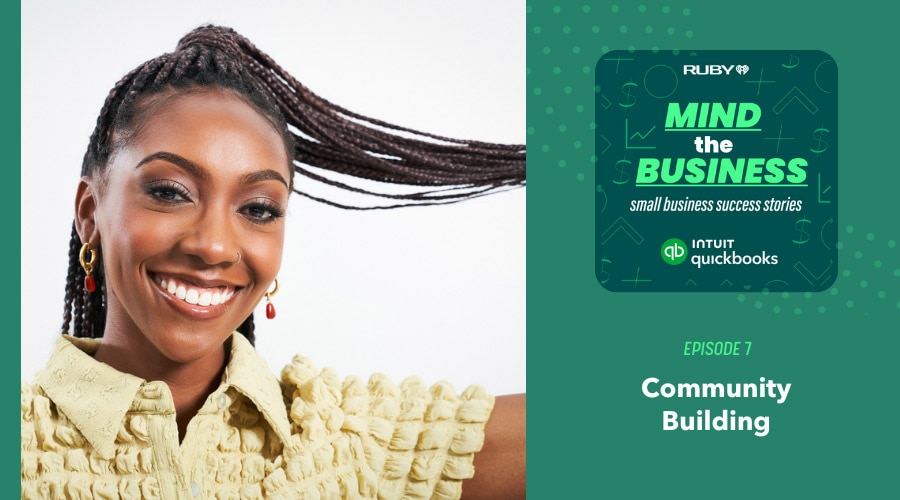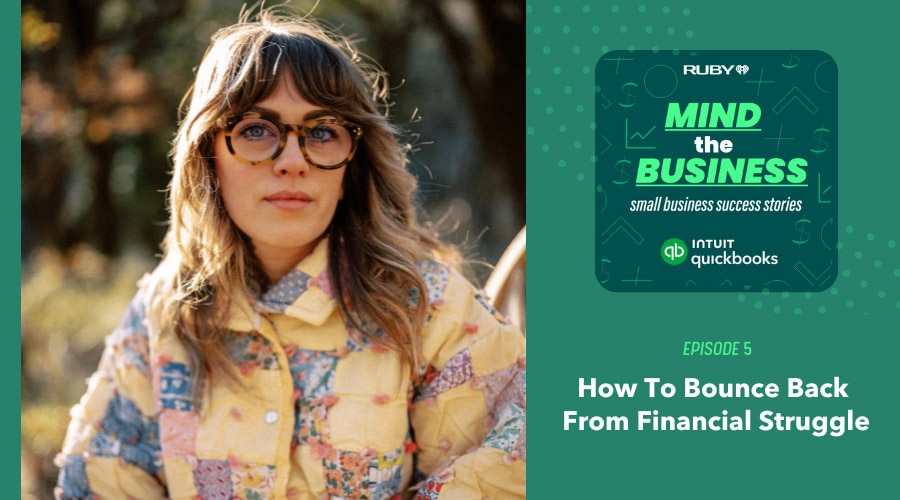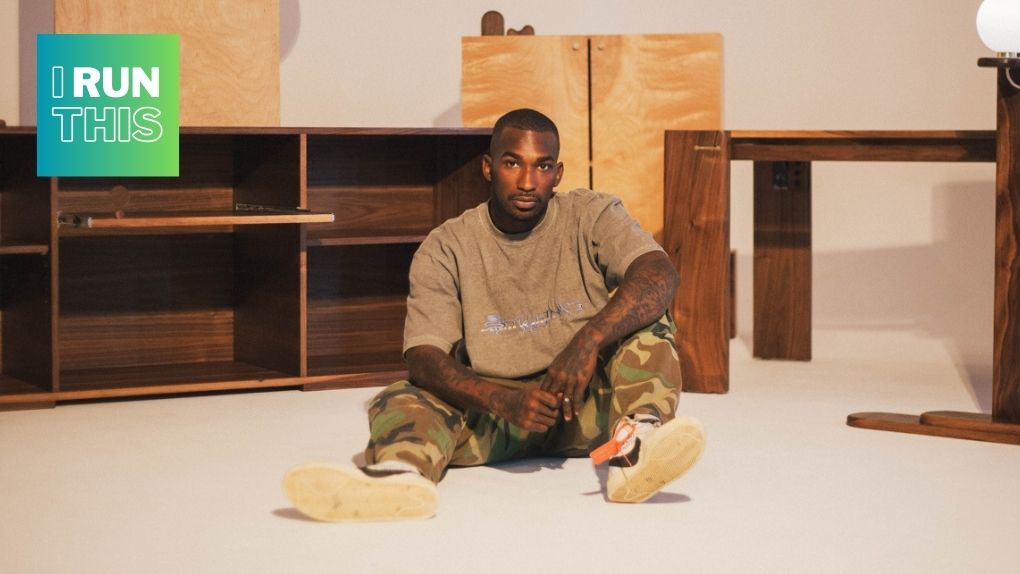Owning a small business can be one of the most rewarding and challenging things a person does. Amid an uncertain economy and ever-evolving consumer trends, there is a lot to figure out and navigate to ensure your business thrives. Join hosts Jannese Torres (Yo Quiero Dinero) and Austin Hankwitz (Rate of Return) as they connect with small business owners and hear their stories about managing the ups and downs of starting and growing a small business. Listen and learn valuable lessons from their experiences that will guide you along the way through your own small business journey.

Community building with Ciara Imani May
Ciara Imani May is an entrepreneur based out of New York City. After suffering from one too many itchy scalps while wearing her favorite protective styles, Ciara realized she deserved better and set out on a mission to find it for all of us. And when she couldn't find any quality sustainable hair extension products, she decided to make her own. Ciara founded the first ever plant-based faux hair brand, Rebundle. In 2020, she left her fintech job to pursue Rebundle full-time. She launched her first product, Braid Better in 2021, and has since relaunched as a direct-to-consumer brand and raised $2.5 million in seed money. Ciara is passionate about providing quality products, building a better earth, and about the importance of Black women being cared for.
Jannese Torres: Ciara, welcome to the show.
Ciara Imani May: Thank you. Thanks for having me.
JT: First of all, I love the name Rebundle. Can you tell us the story behind it?
Ciara: Yes. It's a short one because I didn't come up with the name myself and I actually wasn't sold on it at first. I didn't think it made sense for what I thought we were gonna be doing at the time. But it was really catchy, so we stuck with it and we've grown into the name.
JT: I love that — that it's not necessarily the first idea that would come to your head. But when did you know that this was the name that you wanted to continue with?
Ciara: Well, I would sometimes not feel connected to the name “Rebundle” in those early days because the word bundle…it relates to hair and pertains to hair, it’s a colloquialism for human hair bundles. And I was squarely focused on creating an alternative to synthetic hair. So I didn't think it made sense in the context. But as the product evolved and the brand evolved, it did make sense because we started calling our products bundles rather than packs because we're providing a more luxurious experience. An elevated experience. And I wanted to disassociate from packs that are, you know, anywhere from a dollar to $8. It’s something more premium, like what we pay for human hair extensions. So it started to make sense to me then, and I was like, “Oh, okay. We can keep it.” I mean, we had already spent so much on the branding at that point, but I always had a nagging thought in the back of my mind, like — someone's gonna call out that it doesn't make sense to call it bundles, and then no one ever did because we started moving in that direction.
JT: You have to believe it before anybody else does, right? I think it's part of just the importance of having conviction when you're putting yourself out there as an entrepreneur and as a brand. So have you always been into sustainability and the environment?
Ciara: In a way. I can say that for as long as I can remember, I've always had an inkling or a desire to learn more about sustainability and what it looks like, and just curious about how my presence on earth impacts the environment and the well-being of the environment in ways that I could mitigate. Mitigate my individual contribution. And I've always been very encouraging to other people to do the bare minimum. Recycling really is the bare minimum.
That was all that I knew up until I started grad school. I went to USC and studied social entrepreneurship and I was just exposed to a totally different lifestyle in Los Angeles compared to the midwest, where I grew up. But the projects that my classmates were working on also exposed me to different types of sustainability and just expanded that definition for me. So I took those learnings and started to apply them to my own life. And I got more curious about the movement for sustainability, the zero waste lifestyle, and content that was being created around environmental justice and intersectional environmentalism. Just all these concepts that I was learning about that really resonated with me. And that subsequently translated into the products that I was using and I'm familiar with. And hair just made the list because it was, you know, part of my life and my identity at that time.
JT: That's brilliant. It's a good example of how your environment can influence you as an entrepreneur and how the community that you surround yourself with can have a direct impact on what that business turns into. So I'm curious for you, when did you realize that there was a market for this that wasn't being fulfilled?
Ciara: The summer of 2019. I was working at an HBCU and was wearing braids really often because I was trying to figure out how to be an adult and go to work on time and minimize my morning routine. This was the very same time that I was learning more about sustainability. I was having issues with scalp irritation from the hair and just had this sort of a-ha moment that maybe there was something more that could be done about the way synthetic hair is disposed of. And then that meant understanding, “Well, what is it made out of?” And that brought up all this stuff about synthetic hair being plastic. And I think at this time, in 2019, somebody had just passed a law or some regulation change that we couldn't ship our trash to China anymore. All these things were coming up about the world changing and responding to climate change.
And I'm just sitting here scratching my head like, “Well, this is a plastic product, probably not on anyone's radar and could use innovation like everything else.”
Austin Hankwitz: To me when I hear Rebundle, I think recycle. You have an awesome recycling program. Can you talk a little bit about that?
Ciara: Yeah. I remember being really excited about the question: If it's plastic, can it be recycled? I then learned that all plastics are technically recyclable, but it's dependent on the municipality and what they want, what they don't want. Hair was likely never going to make the list, but I wanted to know for the hard to recycle plastics, like synthetic hair, you know, where could you send it for it to be properly disposed of?
And there were not any initiatives that were focused on this waste stream in particular because it's a product that's predominantly used and worn by Black women. So I knew that if I wanted to find a way to sustainably dispose of it, I was probably gonna have to create it myself because nobody was looking at this waste stream as one that needed attention. So the recycling program was developed and has since been maintained as a way for people to choose sustainability no matter where they are in their journeys, and to help mitigate some of the waste that's created by this industry overall.
AH: I love that. I think it's so powerful and I really commend you for sort of building that from scratch. You talked about studying entrepreneurship in school and, you know, I studied a little bit of entrepreneurship. I think I took a couple classes in college. But I don’t think anything can prepare you for entrepreneurship, right?
Ciara: I think that the only thing that can teach you how to be an entrepreneur is to be one and to be in the thick of it. But what I was grateful for in both undergrad and grad was the help of developing my entrepreneurial mindset and to give me the right community of people who were also working on challenging problems and starting things from scratch. It also helped with the vocabulary and certain concepts and practices that I didn't know beforehand. It was interesting and I didn't know I could make a career out of it before I started school. So I feel like I got a lot out of that and I do find that people who are just starting out and didn't study entrepreneurship in school are like starting from scratch.
AH: You mentioned something really important, which was community, right? You do sort of build that network and that community. When you are in school and you're surrounded by other people who are excited about entrepreneurship, how has that community followed you out of school? Now that you've actually started your company, are these people checking in? Have you leaned on them at all with different problems over the last couple years?
Ciara: Yeah. I would say yes to all of the above. There are definitely people that I met in undergrad that I've gone back to, whether that be professors or students alike that I've been able to go back to for questions or feedback, support, introductions, et cetera.
And then following me from undergrad all the way through. My fellowship with VFA, I am friends with a lot of those fellows, some that have started businesses and some that work at startups. So I think there are different communities within those communities that I can leverage for different purposes that have helped in ways that I can't even begin to recall. Even if it's an intro or just an ear, things just come up. Things happen for you when you expand your network with people that are interested in some of the same things that you are, whether you're following the same path or not.
AH: You are definitely a part of this environmentalist community as well as the entrepreneurial community. So maybe you can double click on how you're expanding your network post-college and post-schooling. How have you been able to expand your network of other environmentalists or other just entrepreneurs in your surrounding area?
Ciara: So it's a pretty tight-knit community and many of them…you know, you meet one and then they introduce you to another person in their community. And even if that one-on-one connection doesn't happen, I also get to see who's a part of their community. So I was finding a lot of people that were involved in the environmentalist movement from creators that I was following and entrepreneurs that I was following — it just exposed me to people who were like-minded and were doing their own thing.
AH: Being the founder of such an innovative business means that you have to really use every part of your brain, which means the logistical side of running the business every day, as well as the creative side. So, Ciara, do you have any strategies for keeping your books balanced while using community connections and networking to raise money and grow your business at the same time?
Ciara: First, you need a good bookkeeper. I really love the bookkeeping team that we have. What they have really impressed me with is they built us a financial dashboard that lists all of our spending in and out. We have budget templates and all the sales are linked to transactions in QuickBooks. So I can always see in real time how far or how close we are to being on budget. That has been a really monumental process. It really gives me peace of mind.
JT: You’ve spoken in interviews about the challenges of being a Black business owner and as an entrepreneur and coach myself, I know very well the statistics do not favor people of color, especially when it comes to raising capital and funding. Can you talk about some of the challenges that you've faced in your journey, and do you have any examples of where your community has come in to help you overcome them?
Ciara: I'll start with that one. So with a product like ours that is predominantly used by Black women, and people of color in general, who wear braids. I would say I don't have to spend as much time explaining or convincing them that this problem exists and that the solution should also exist. And so I get a lot of excitement when I tell people within our community about what we're doing and you know, they wanna refer their friends and their coworkers, their family members who identify with this issue. On average, one in three wearers are going to experience scalp irritation while wearing braids. So if I'm talking to someone who looks like me, if they themselves are not prone to scalp irritation, they know someone else that is. And so we've been able to leverage word of mouth in that regard.
But with that has come challenges on the funding side and the storytelling side of making a compelling case for this problem. Because there's very limited data that exists around consumer behavior in this category. And venture capitalists are data-driven. They make decisions based on biases that they see in their portfolio, but also readily available data that helps drive their investment decisions.
So that's two things that I can't always provide. So I have to give really thoughtful answers while also being candid that we're building in a white space and we know that there's money flowing through here, because that much is available online. But some of the more nitty gritty details that are more readily available through consumer research…it's not quite there for hair extensions today.
JT: Well, that makes sense, right? Because it really depends on who's doing the research and who they're talking to. And a lot of this information can be very anecdotal and it's not something that, you know, you'd necessarily have a pie chart that you could go and reference.
There was a recent statistic that I read the other day that said about 46% of Black business owners cite community support as a primary motivation of their business. Would you say that that's a primary motivating factor for you?
Ciara: A hundred percent. I would say since the beginning, we've always had a good relationship with our community and more so today because a lot of my focus this quarter and this year is on building relationships with beauty supply stores and salons, and so I get a lot of energy from talking with these usually sole proprietors about their small business and their challenges and what they need to succeed and why we should work together. Many of them are taking a bet on us because we're a new product at a higher price point in a category that has not seen any innovation. I have to explain to them why we're doing what we're doing and what success we've seen to date.
And in return I get to learn about their individual businesses, how they came into the beauty industry, and what questions they get from their customer base. So it's really rewarding to be able to network pretty horizontally actually.
JT: So we've talked about the importance of networking amongst your entrepreneurial circle, and we did talk about how community has impacted your own mission as an entrepreneur. What strategies do you have for fostering, returning and happy customers?
Ciara: Customer service and authenticity. Also being able to connect with your community in person. So we're prioritizing more of that this year, as well. But I would say I've seen huge returns from providing customers with a pleasant experience from checkout to Install.
We have a braiders directory on our site, which allows our customers to browse professionals near them if they want to go to a Rebundle-approved braider. And even something as simple as, you know, software that we have on the site that makes suggestions, our FAQs that are really thorough, and having a chat bot on our website for quick answers. We’re really trying to provide a seamless shopping experience for our audience and it has paid off in returning customers, and also building a really strong opportunity for referrals from one customer to another.
JT: That's great. That word of mouth is really powerful. So when it's harnessed in a way that's strategic, I think it can have a really big impact on building out that community.
AH: So before this interview, Ciara, I jumped on your website and I clicked around on your products, and I saw you had a bunch of great reviews. But while looking at these reviews, I also saw that you were doing a really good job of getting back to people, right? Thanking them for their feedback or even their considerations moving forward for your products. How have reviews helped you foster community, and helped you find your super fans and those awesome returning customers?
Ciara: That's a great question. The reviews can be scary. Like whenever I get that email — that I have a new review — my heart always drops, good or bad. And so I always make a point — and it's usually me responding, if not one other person from my team — but I always think it's a good idea to make sure people feel validated with their reviews because they're leaving it for the company to see, but they're also leaving it for other people to see. So I just wanna make sure that they feel like their concerns have been acknowledged. And some of them, we may send them an email separately asking more questions or asking them if we can use their review for content, et cetera.
So I think that reviews are really a key way to build trust among new customers. Your current customers are probably not reviewing the reviews until after the fact, but it does give new customers an opportunity to make an informed purchase. The only way we're going to grow is by serving this community and serving them well. I want to give them the opportunity to help guide our product development roadmap with the few dollars we have.
JT: So you've talked about the importance of Black women feeling comfortable and cared for. How does that mission inform the way that you build your brand and you market your products?
Ciara: I would say in the early days, we really wanted to evoke the feeling of resting and being at peace and at ease and not having to worry when you get your hair braided. And since then, that motif has evolved in the end-to-end experience of getting your hair braided. So the other products that we've added — an edge gel, a high quality edge brush, and we're launching some other products later this year. We believe that when people get their hair braided and they make an investment in this experience, they're making an investment in the hair, but also in the takedown and all the other steps that are involved with getting braids…even to the person that's installing them.
We're focused on making sure that when people think about the future of hair extensions, it includes safe and non-toxic ingredients, a seamless checkout experience, a seamless install experience, a seamless takedown experience, and reusing. Our bundles are, on average, about an ounce and a half bigger than a standard plastic bundle, so you don't need as much hair for an install with rebundle. And then because of the thickness of the fibers, they're also better candidates for reuse. You can reuse the bundles up to three times and you can wash them like normal. You can also use dry shampoo if you're in a rush and do it all over again. And once you're done with the hair, it can be composted.
JT: I love that it's like you're infusing the idea of luxury and that soft girl life into the brand.
Ciara: I guess so. Yeah. I don't live a soft life, but hopefully our customers do.
JT: So your products are great for the health of the planet and the environment, but they're also great for the health of your customers. What are the plans that you have for Rebundle in the future?
Ciara: We are continuing to explore other applications for the fiber technology that we've developed, so other types of hair extensions beyond just braids. And then I'm also really focused on how we make this product more accessible and available. So pricing is always going to be a point of contingency for people that are trading up from a lower price synthetic, but we know we can capture more of them with different pricing strategies. That’s just one area that we're working on this year, but also making sure that the products are available in beauty supply stores, and in big box retailers where prestige beauty is — because we do see our product as a luxurious experience.
JT: I love it. Do you have a story that sticks out to you from your community that's really shifted your mindset?
Ciara: Yeah, I would say there's been a number of customers who've told us that they're wearing braids again for the first time in several years. It's something that they thought just wasn't for them anymore. Their scalps couldn't tolerate it, and so they've sort of given up on it. Braids are a really intricate part of Black culture and Black hair. So I can't imagine what it would be like to not be able to wear braids. But that is a lot of people's reality. So it's really invigorating to hear from someone that they were able to wear braids again for the first time in a long time, and they're able to rejoin that part of their culture.
This podcast is a production of iHeartRadio and Intuit QuickBooks. Our executive producer is Molly Sosha, our supervising producer is Nakia Swinton, and our writer is Eric Leeja. Our head of post production is James Foster. QuickBooks Money is a stand alone Intuit offering. Banking services provided by Green Dot Bank, member FDIC. Only funds in envelopes earn annual percentage yield. APY can change at any time. Money Movement Services provided by Intuit Payments, Inc., licensed as a money transmitter by the New York State Department of Financial Services.










